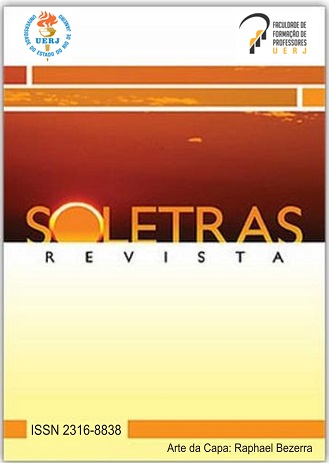Brian Selznick’s The invention of Hugo Cabret, Martin Scorsese’s Hugo, and the theft of subjectivity
DOI:
https://doi.org/10.12957/soletras.2012.5026Palavras-chave:
Hugo. Brian Selznick. Martin Scorsese. Subjectivity. Adaptation.Resumo
Sanders (2006) and Hutcheon (2006) are among the many adaptation theorists whochallenge the criterion of ‘fidelity’, and yet a frequent response to Martin Scorsese’sAcademy Award-winning film Hugo is that it is faithful to Brian Selznick’s Caldecott Medalwinningbook The invention of Hugo Cabret. This paper argues that in each case the mediumdetermines a significant difference in the construction of subjectivity. The book’spreoccupation with theft indicates a Lacanian concern with the origin of subjectivity and theimplied author’s subtextual guilt about his dependence on the work of another artist. Thefilm’s shift in emphasis to the necessity of relationships and family, however, parallelsKristeva’s assumption that intertextuality is inevitable. As Geraghty (2009) points out,adaptation is by definition dependent on another text. Consequently, Scorsese’s Hugo ignoresthe book’s concern with originality and, at a time when cinema is again being repositioned bytechnological change, celebrates the continuity and heritage of the medium.Downloads
Publicado
Edição
Seção
Licença
A aprovação dos artigos implica a cessão imediata e sem ônus dos direitos de publicação nesta revista. O(s) autor(es) autoriza(m) ao Programa de Pós-graduação em Letras e Linguística (PPLIN) a reproduzi-lo e publicá-lo na revista SOLETRAS, entendendo-se os termos “reprodução” e “publicação” conforme definição do artigo 5° da Lei 9610/98. O(s) autor(es) continuará(rão) a ter os direitos autorais para publicações posteriores. O artigo poderá ser acessado pela rede mundial de computadores (http://www.e-publicacoes.uerj.br/index.php/soletras), sendo permitidas, a título gratuito, a consulta e a reprodução de exemplar do artigo para uso próprio de quem o consulta. Casos de plágio ou quaisquer ilegalidades nos textos apresentados são de inteira responsabilidade de seus autores.



